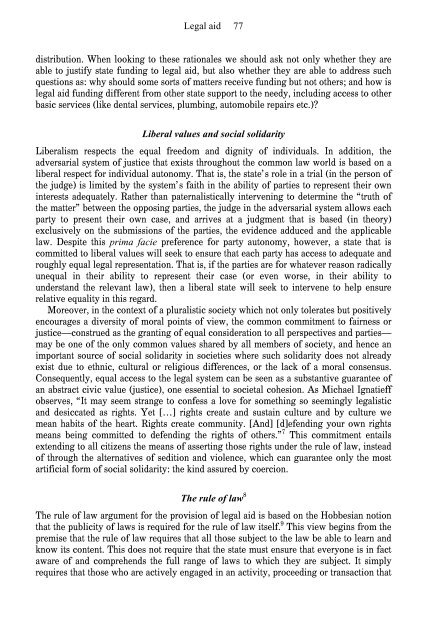Rethinking the Welfare State: The prospects for ... - e-Library
Rethinking the Welfare State: The prospects for ... - e-Library
Rethinking the Welfare State: The prospects for ... - e-Library
You also want an ePaper? Increase the reach of your titles
YUMPU automatically turns print PDFs into web optimized ePapers that Google loves.
Legal aid 77<br />
distribution. When looking to <strong>the</strong>se rationales we should ask not only whe<strong>the</strong>r <strong>the</strong>y are<br />
able to justify state funding to legal aid, but also whe<strong>the</strong>r <strong>the</strong>y are able to address such<br />
questions as: why should some sorts of matters receive funding but not o<strong>the</strong>rs; and how is<br />
legal aid funding different from o<strong>the</strong>r state support to <strong>the</strong> needy, including access to o<strong>the</strong>r<br />
basic services (like dental services, plumbing, automobile repairs etc.)?<br />
Liberal values and social solidarity<br />
Liberalism respects <strong>the</strong> equal freedom and dignity of individuals. In addition, <strong>the</strong><br />
adversarial system of justice that exists throughout <strong>the</strong> common law world is based on a<br />
liberal respect <strong>for</strong> individual autonomy. That is, <strong>the</strong> state’s role in a trial (in <strong>the</strong> person of<br />
<strong>the</strong> judge) is limited by <strong>the</strong> system’s faith in <strong>the</strong> ability of parties to represent <strong>the</strong>ir own<br />
interests adequately. Ra<strong>the</strong>r than paternalistically intervening to determine <strong>the</strong> “truth of<br />
<strong>the</strong> matter” between <strong>the</strong> opposing parties, <strong>the</strong> judge in <strong>the</strong> adversarial system allows each<br />
party to present <strong>the</strong>ir own case, and arrives at a judgment that is based (in <strong>the</strong>ory)<br />
exclusively on <strong>the</strong> submissions of <strong>the</strong> parties, <strong>the</strong> evidence adduced and <strong>the</strong> applicable<br />
law. Despite this prima facie preference <strong>for</strong> party autonomy, however, a state that is<br />
committed to liberal values will seek to ensure that each party has access to adequate and<br />
roughly equal legal representation. That is, if <strong>the</strong> parties are <strong>for</strong> whatever reason radically<br />
unequal in <strong>the</strong>ir ability to represent <strong>the</strong>ir case (or even worse, in <strong>the</strong>ir ability to<br />
understand <strong>the</strong> relevant law), <strong>the</strong>n a liberal state will seek to intervene to help ensure<br />
relative equality in this regard.<br />
Moreover, in <strong>the</strong> context of a pluralistic society which not only tolerates but positively<br />
encourages a diversity of moral points of view, <strong>the</strong> common commitment to fairness or<br />
justice—construed as <strong>the</strong> granting of equal consideration to all perspectives and parties—<br />
may be one of <strong>the</strong> only common values shared by all members of society, and hence an<br />
important source of social solidarity in societies where such solidarity does not already<br />
exist due to ethnic, cultural or religious differences, or <strong>the</strong> lack of a moral consensus.<br />
Consequently, equal access to <strong>the</strong> legal system can be seen as a substantive guarantee of<br />
an abstract civic value (justice), one essential to societal cohesion. As Michael Ignatieff<br />
observes, “It may seem strange to confess a love <strong>for</strong> something so seemingly legalistic<br />
and desiccated as rights. Yet […] rights create and sustain culture and by culture we<br />
mean habits of <strong>the</strong> heart. Rights create community. [And] [d]efending your own rights<br />
means being committed to defending <strong>the</strong> rights of o<strong>the</strong>rs.” 7 This commitment entails<br />
extending to all citizens <strong>the</strong> means of asserting those rights under <strong>the</strong> rule of law, instead<br />
of through <strong>the</strong> alternatives of sedition and violence, which can guarantee only <strong>the</strong> most<br />
artificial <strong>for</strong>m of social solidarity: <strong>the</strong> kind assured by coercion.<br />
<strong>The</strong> rule of law 8<br />
<strong>The</strong> rule of law argument <strong>for</strong> <strong>the</strong> provision of legal aid is based on <strong>the</strong> Hobbesian notion<br />
that <strong>the</strong> publicity of laws is required <strong>for</strong> <strong>the</strong> rule of law itself. 9 This view begins from <strong>the</strong><br />
premise that <strong>the</strong> rule of law requires that all those subject to <strong>the</strong> law be able to learn and<br />
know its content. This does not require that <strong>the</strong> state must ensure that everyone is in fact<br />
aware of and comprehends <strong>the</strong> full range of laws to which <strong>the</strong>y are subject. It simply<br />
requires that those who are actively engaged in an activity, proceeding or transaction that


